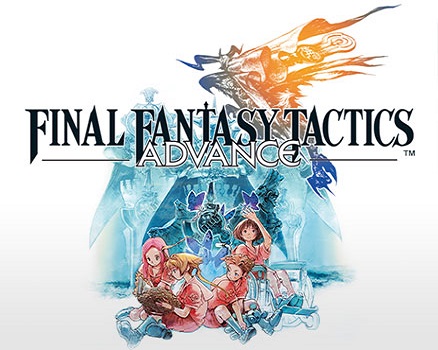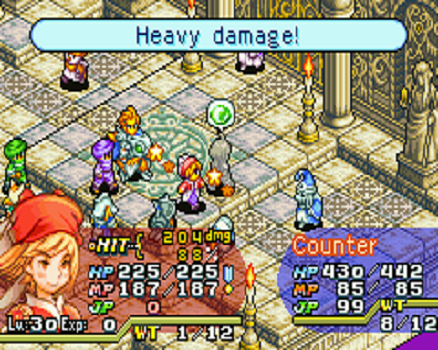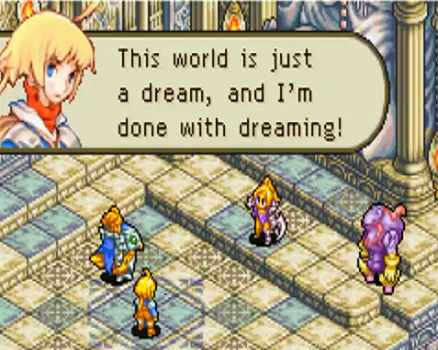INTRODUCTION
Overview
The game's story centers on four children; Marche, Mewt, Ritz, and Doned, who live in a small town named St. Ivalice. The children are transported to a realm of the same name as their town, "Ivalice", after discovering an ancient magical book. The story then focuses on the exploits of Marche as he attempts to return to the real world while facing opposition from those around him.
Settings
Ivalice (イヴァリース Ivarīsu) is a fictional universe setting primarily appearing in the Final Fantasy video game series. The world was co-created by Yasumi Matsuno and Hiroyuki Ito in 1995, and has since been expanded upon by several games as the Ivalice Alliance series. Ivalice is described as a complex world with a very long history, and the stories of Final Fantasy Tactics, Vagrant Story and Final Fantasy XII all take place in it. Though described often as a world, this was only physically true of Ivalice in Final Fantasy Tactics Advance, in which Ivalice was created parallel to the real world. The 'true' Ivalice, as witnessed in the remaining games, describes two distinct locations; a geographical region, and a smaller kingdom, both of which belong to a larger, unnamed world. Generally, however, the term Ivalice is also used to refer to the conceptual setting, rather as one might say the Medieval world of Europe and the Mediterranean.
Story
Ivalice is a world created by four ordinary children: Marche Radiuju, a new student and resident of St. Ivalice and its school; Mewt Randell, a shy boy still attached to the memory of his late mother; Ritz Malheur, an assertive and outspoken classmate of Marche and Mewt; and Doned Radiuju, Marche's younger, handicapped brother and a big fan of fantasy novels and video games. Mewt comes across a dusty old tome in a local used bookstore and eagerly wishes to show it to his friends. Unaware that the book is the legendary Gran Grimoire, Mewt brings the book over to Marche's house along with Ritz. The old book is written in a language none of them have ever seen before, and a single inscription reads: "Alta oron, Sondus kameela". The next morning, Marche wakes up in the world of Ivalice. The fantasy Ivalice is supposedly a reincarnation of Mewt's memories from a Final Fantasy game.
Marche is separated from the others, and immediately begins a quest to return home. Even after realizing how much better his life is in the new Ivalice, he believes that none of it is real and is even more determined to return to his home when he realizes that everyone in town has been dragged into the dream as well, many of whom are now suffering under Mewt's rule or are being slaughtered by the adventuring Clans that populate the world. The other children, and Mewt's father Cid, slowly realize through Marche's efforts that the world has been shaped according to their wishes. Mewt is no longer being teased, is reunited with his deceased mother, and is now the Prince of Ivalice; Ritz no longer has her white albinic hair, instead having the silky red hair which she always wanted; Doned can now walk and is no longer sickly; Marche is suddenly athletic and popular; Cid is the highest-ranking official in the nation; and all of them now live in Final Fantasy, the video game the children all love.
Eventually Marche succeeds in his quest to return Ivalice to normal. He achieves this by destroying the crystals, or world threads, of Ivalice, defeating Llednar Twem (the manifestation of Mewt's negative emotions), and killing the Li-Grim, the physical manifestation of the book's wish-based magic that had been masquerading as Mewt's mother, Queen Remedi. He teaches the other children in the process that they cannot live in fantasy but must learn to live with their misfortunes in reality. The other children are wiser from the experience, as the ending reveals them all to have become happy with themselves.
In addition to the main plot, there are two side plots: the Redwing Arc and the Judge Arc. The Redwing Arc centers around the Redwings clan, a foreign crime ring, their subordinate clan Borzoi, and their smuggled foreign monsters. The other is the Judge Arc, unlockable after beating the main three hundred missions. This serves as an alternative ending where Marche never goes on his quest and stays in Ivalice, overthrows several corrupt judges, and becomes next in line for Cid's judge sword
Gameplay
In Tactics Advance, turn-based tactical battles take place on a three-dimensional isometric field. The player takes the role of Marche, a clan leader; he must organize the clan's members and advance their status through missions that are offered in pubs. The player competes against the computer's team in turn-based play, although unlike Final Fantasy Tactics characters execute their actions instantly.
Missions are tasks undertaken by a clan. There are four types of missions: regular, encounter, dispatch, and area. In regular missions, Marche's entire party ventures to a particular location to do battle. Many of these missions are used to advance the story. In encounter missions, Marche's group battles a rival mercenary clan by purchasing a mission or meeting them on the map. In dispatch missions, which do not involve battle, Marche temporarily sends away one member from his party. Area missions are usually a dispatch mission where Marche's clan can liberate certain regions to obtain bonuses and discounts at shops.
Some missions, typically dispatch missions, require a special item to be in possession in order to accept the mission. Others require a dispatch character to have a specific job class. In regards to items, this may mean another mission must be done to get an item that would allow you to perform the later mission.
The world map is initially empty except for the starting location; it is customized as the player wins location "tokens" after certain missions. These tokens represent different terrains and settlements, such as plains, mountains, deserts, forests, and towns, that can be placed in slots on the world map. Items are rewarded to the player depending on the placement of the tokens. Ivalice also introduces areas called jagds, lawless slums that Judges avoid. Jagd is a German word which means the hunt. Jagds are the only places in the game in which a character can die; everywhere else, they are protected from death by the Judges and are simply knocked out.
Tactics Advance also offers multiplayer capability for two players. Players may cooperate or compete using a link-cable peripheral, and also trade items and party members. Additional missions and items are also offered when players link.



